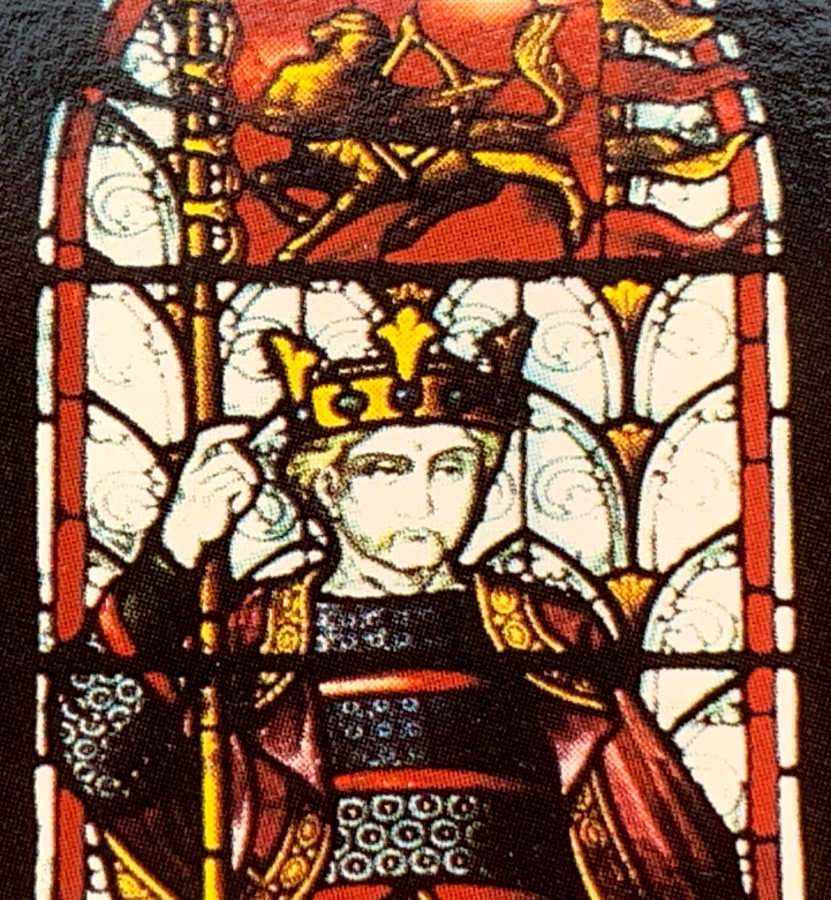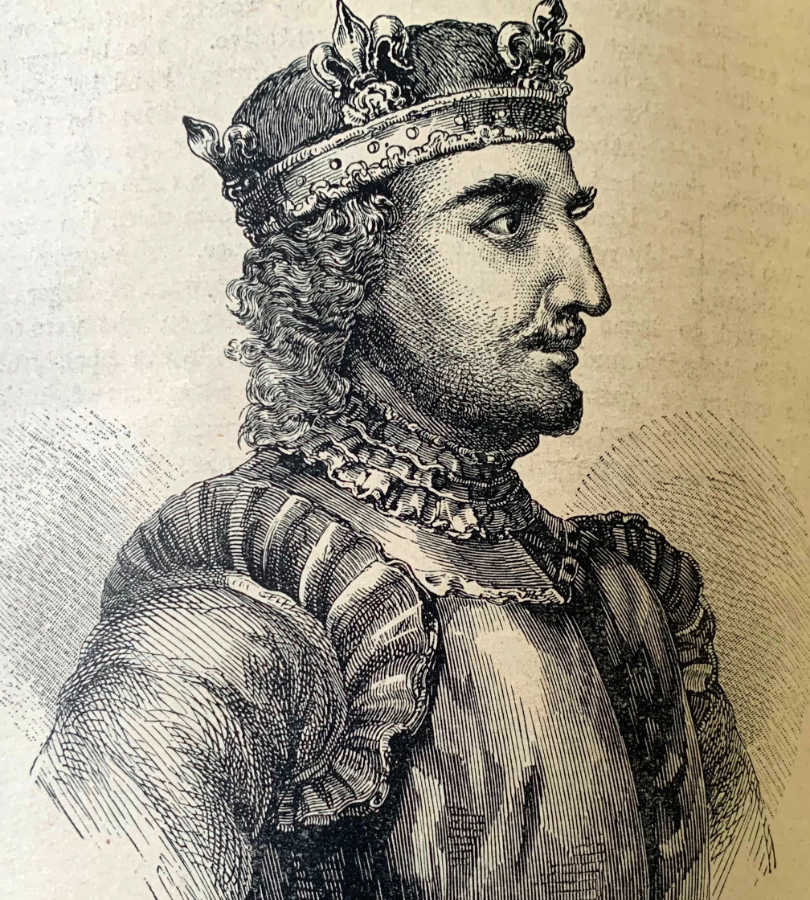Stephen
The anarchy of King Stephen
Born 1092 or 1096, Blois | Died 25 October 1054, Dover, England
Son of a crusader, grandson of William the Conqueror, 'new man', knight, king and captive. Chivalrous as kings are in the stories.

It is never comforting to realise how fragile things can be. No doubt this was as true in the twelfth century, even if a greater exposure to acts of God and the hand of chance may have bred in a more sanguine attitude. We like to get to the root of the problem; the faulty part that let down the machine and must be avoided in future.
King Stephen's reign is just such a case. Strong central government - the case for English exceptionalism in the period, if a case can be made at all - to all intents and purposes collapses like a house of cards in a handful of years. Nor is there a quick recovery to health, just drift through the late 1140s and well into the next decade.
Stephen, the diagnosis goes, was the bug in the system. The outside influence racing into the breach in 1135. Dashing, but fundamentally unfit to be king.
Really?
The Anglo-Norman barons knew what they were getting in 1135. Stephen had been a fixture on the English scene since the 1110s. He may have been slightly older than Henry's son - old enough to make his excuses and leave the fateful White Ship voyage - but he was a clear part of that most exclusive group. More than that, as a grandson of the Conqueror he was family. So if Stephen's speed and decisiveness in 1135 surprised anyone, he was hardly a leap in the dark. Apart from Baldwin de Redvers' token resistance in Exeter, they backed him to a man.
Why did they do this? Baronial tension had been simmering under Henry I over the right of children to inherit family lands. The king maintained it was conditional, often the condition of a large fee. The Conqueror's principle was that he alone owned the land, others only held it at his pleasure. Now established, barons wanted to preserve what they had built up by hook or by crook. The prospect of new men being rewarded at their expense was not welcome, even if any irony was lost on a landed class that had been in place for only eighty years.
Stephen, we can only assume, offered a good bet for a move in the right direction. It may have been sensitivity to this which led him not to punish Baldwin. Starting the reign with more land seizures and reallocation would not have sent the right message.
Which is fair enough, but then why having defeated David, king of the Scots, at the battle of the Standard in 1138 did Stephen reward David with the three northern counties of Northumberland, Cumberland and Westmorland without even homage in return? There may have been relatively few barons to alienate in the far north, and a secure border would have been essential if a conflict with Matilda and Geoffrey was coming in Normandy, but this was a high price for a victor. King as protector it was not.
"Too generous" was the view of the Gesta Stephani - the Deeds of King Stephen - which given that this should be a loyalist volume must have been something of an understatement. Yet if there was to be a new relationship between the Crown and the barons' lands then something would have to give. There are more hints of the same kind of admittedly shakey strategy.
Both Stephen and the Empress Matilda created new earldoms. These were smaller, often along shire lines and importantly hereditary, in contrast to the sheriffs who remained appointed royal officials.
The arrest of chief royal administrators, Roger Bishop of Salisbury and his nephews, was such a big step that it is hard to believe Stephen had not rounded up support first or at least had good reason to believe that he would gain more than he lost. Breaking the significant power of these royal governors, if risky, is consistent with the idea of rebalancing responsibilities and powers between sheriffs and earls - the agents of the Crown and the barons. Indeed, the Anglo-Saxon Chronicle calls the churchmen "traitors" who when released "committed every enormity". The problem seems to have arisen as much from Stephen's release of the men as their fall from grace.
He was a kindly man, gentle and good, and imposed no penalty.
Anglo-Saxon Chronicle
That was the Chronicle's view. Others agreed. "He was even of such a kindly and gentle disposition that he commonly forgot a king's exalted rank and in many affairs saw himself not superior to his men, but in every way their equal, sometimes their inferior" was the view of the Gesta Stephani. William of Malmesbury, writing in about 1150, added:
with all respect for a kindly man, who, if he had acquired the kingdom in a lawful way and in administering it had not leant ears to the ill-disposed, would certainly have lacked little that adorned the royal character.
In 1141, a smaller force led by King Stephen came upon the Empress Matilda's army at Lincoln. It was midwinter - not the best time for campaigning - and sense would have suggested a graceful withdrawal. Stephen, though, attacked.
Henry of Huntingdon recorded that:
the most valiant king had taken his stand and the foe recoiled from the incomparable fury of his counter strikes... At length, his battle axe was shattered with repeated blows, whereupon he drew his trusty sword, well worthy of a king.
Henry of Huntingdon
"...the whole army was either slain or captured."
Stephen, imprisoned, gave his permission for his followers to submit to Matilda.
Generosity. Magnanimity. Kindness. Chivalry. Stephen the knight was at the forefront of the age. Chivalry, save for a thin veneer, would never be a trait of kings.
And yet, for Stephen, this was probably very important. His father had been on the First Crusade but, as conditions worsened, returned home. Stephen's mother, who had been running the county of Blois, was aghast - sending her husband straight back to the Holy Land where he died. Family honour had been impugned and this stuck. Being the one who ducked out of the White Ship cannot have helped. Stephen may have inherited the stigma, but he had a point to prove. There was clearly a way he would do things.
There was benefit to this. When Stephen was released, his followers remained. His wife, Queen Matilda, held Kent and the South East for him. While royal control was not reasserted - many barons relishing their relative freedom and administrative Pipe Rolls revealing significant waste across many counties when they resume in the 1150s - the later 1140 moved towards more stable attrition. Even the young Henry Plantagenet's first foray in 1148 could not break the deadlock, eventually bailed out by Stephen himself when it ran out of money to pay its mercenary troops. This would prove uncharacteristic for Henry. It was true to form for Stephen. Form that would see him through to a natural death, still king, in 1154.

Without Stephen would all have been well?
He undoubtedly made a lot of his own problems. His family ghosts may have pushed him to action, but the ghost of Henry I may also have held him back. Change needed to come in 1135 and in that there would always be losers. It was Stephen's bad luck that the very circumstances that brought him to power gave a home to those who felt the new king did not give them what they wanted. It was Stephen's bad judgement that he did not change himself enough to give them the ruthlessness that they needed, in a way that would remove opposition more permanently. But he was not cast out. Personal loyalty, that rarest of commodities in his reign, was enough to see him through to the end, and could come in its own way even from the future Henry II himself.
It was not enough. The Empress commanded enough practical loyalty to win Normandy and hold much of England, prolonging divisions and preventing the resolution that so swiftly restored central royal government in the 1150s. There were enough barons hedging their bets or profiting from the uncertainty to see to that. If by 1135 a status quo had run its course, it would take time for a replacement to be accepted. Stephen's version never was; neither was Matilda's. Henry II, making the most of his own momentum in an exhausted kingdom, would bring his own solution.
Stephen was a fine knight, but in the end not a king. Even at this distance, it is easy to appreciate his qualities, which in many ways were from a different, later age.
Asking 'what if' can be a risky business, but the road not travelled can be an interesting direction. Stephen's reign was a pivot between the post-Conquest world and the debates between Crown and baronage that would lead on to Magna Carta. The upheaval was accentuated and prolonged by the presence of two competing centres of power, both flawed and yet balanced. Stephen both harks back to Harold Godwineson and, in his knightly chivalry looks forward to William the Marshal, protector of the young Henry III in the early thirteenth century. While he lacked the pre-eminence and decisiveness of Harold, the parallel with William is intriguing. Had Henry I appointed Stephan as protector and regent for his young son rather than trusted his lands to his haughty daughter and Angevin son-in-law, a balance between the factions could have been built that led to quite different results.
